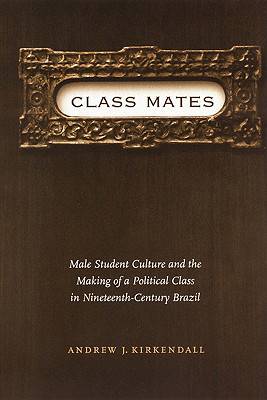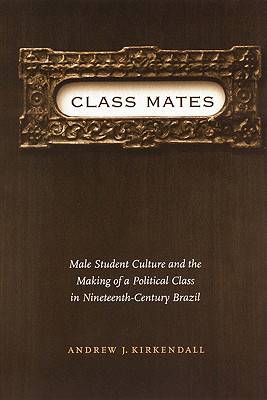
- Afhalen na 1 uur in een winkel met voorraad
- Gratis thuislevering in België vanaf € 30
- Ruim aanbod met 7 miljoen producten
- Afhalen na 1 uur in een winkel met voorraad
- Gratis thuislevering in België vanaf € 30
- Ruim aanbod met 7 miljoen producten
Class Mates
Male Student Culture and the Making of a Political Class in Nineteenth-Century Brazil
Andrew J KirKendallOmschrijving
This innovative study considers how approximately seven thousand male graduates of law came to understand themselves as having a legitimate claim to authority over nineteenth-century Brazilian society during their transition from boyhood to manhood.
While pursuing their traditional studies at Brazil's two law schools, the students devoted much of their energies to theater and literature in an effort to improve their powers of public speaking and written persuasion. These newly minted lawyers quickly became the magistrates, bureaucrats, local and national politicians, diplomats, and cabinet members who would rule Brazil until the fall of the monarchy in 1889.
Andrew J. Kirkendall examines the meaning of liberalism for a slave society, the tension between systems of patriarchy and patronage, and the link between language and power in a largely illiterate society. In the interplay between identity and state formation, he explores the processes of socialization that helped Brazil achieve a greater measure of political stability than any other Latin American country.
Andrew J. Kirkendall is an assistant professor of history at Texas A&M University.
Specificaties
Betrokkenen
- Auteur(s):
- Uitgeverij:
Inhoud
- Aantal bladzijden:
- 270
- Taal:
- Engels
- Reeks:
- Reeksnummer:
- nr. 6
Eigenschappen
- Productcode (EAN):
- 9780803278042
- Verschijningsdatum:
- 1/03/2002
- Uitvoering:
- Paperback
- Formaat:
- Trade paperback (VS)
- Afmetingen:
- 154 mm x 228 mm
- Gewicht:
- 385 g

Alleen bij Standaard Boekhandel
Beoordelingen
We publiceren alleen reviews die voldoen aan de voorwaarden voor reviews. Bekijk onze voorwaarden voor reviews.











